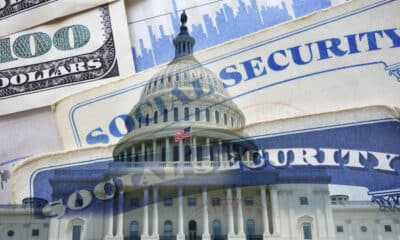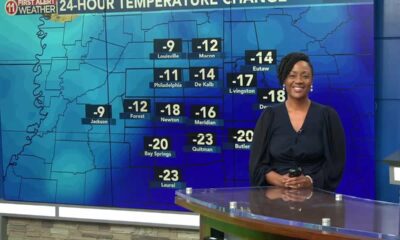Kaiser Health News
First Responders, Veterans Hail Benefits of Psychedelic Drugs as California Debates Legalization
Bernard J. Wolfson
Mon, 13 May 2024 09:00:00 +0000
Wade Trammell recalls the time he and his fellow firefighters responded to a highway crash in which a beer truck rammed into a pole, propelling the truck’s engine through the cab and into the driver’s abdomen.
“The guy was up there screaming and squirming. Then the cab caught on fire,” Trammell says. “I couldn’t move him. He burned to death right there in my arms.”
Memories of that gruesome death and other traumatic incidents he had witnessed as a firefighter in Mountain View, California, didn’t seem to bother Trammell for the first seven years after he retired in 2015. But then he started crying a lot, drinking heavily, and losing sleep. At first, he didn’t understand why, but he would later come to suspect he was suffering from post-traumatic stress disorder.
After therapy failed to improve his mental well-being, he heard about the potential benefits of psychedelic drugs to help first responders with PTSD.
Last July, Trammell went on a retreat in Puerto Vallarta, Mexico, organized by The S.I.R.E.N. Project, a nonprofit that advocates the use of psychedelics and other alternative medicines to help first responders. He took psilocybin mushrooms and, the next day, another psychedelic derived from the toxic secretions of the Sonoran Desert toad. The experience, he says, produced an existential shift in the way he thinks of the terrible things he saw as a firefighter.
“All that trauma and all that crap I saw and dealt with, it’s all very temporary and everything goes back into the universe as energy,” Trammell says.
Abundant research has shown that psychedelics have the potential to produce lasting relief from depression, anxiety, PTSD, addiction, and other mental health conditions. Many universities around the United States have programs researching psychedelics. But experts warn that these powerful drugs are not for everybody, especially those with a history of psychosis or cardiovascular problems.
Most psychedelic drugs are prohibited under federal law, but California may soon join a growing number of local and state governments allowing their use.
A bill working its way through the California Legislature, would allow the therapeutic use of psilocybin; mescaline; MDMA, the active ingredient in ecstasy; and dimethyltryptamine, the active ingredient in ayahuasca, a plant-based psychoactive tea. The drugs could be purchased and ingested in approved locations under the supervision of facilitators, who would undergo training and be licensed by a new state board. The facilitators would need a professional health credential to qualify.
The bill, co-sponsored by Sen. Scott Wiener (D-San Francisco), Assembly member Marie Waldron (R-San Diego), and several other lawmakers, follows last year’s unsuccessful effort to decriminalize certain psychedelics for personal use. Gov. Gavin Newsom, a Democrat, vetoed that bill, though he extolled psychedelics as “an exciting frontier” and asked for new legislation with “regulated treatment guidelines.”
Wiener says the new bill was drafted with Newsom’s request in mind. It is supported by some veterans and first responder groups and opposed by numerous law enforcement agencies.
One potential roadblock is the state’s budget deficit, pegged at between $38 billion and $73 billion. Newsom and legislative leaders may choose not to launch a new initiative when they are cutting existing programs. “That is something we’ll certainly grapple with,” Wiener says.
The legislation, which is making its way through committees, would require the new board to begin accepting facilitator license applications in April 2026. The system would look somewhat like the one in Oregon, which allows the use of psilocybin mushrooms under the guidance of state-licensed facilitators at psilocybin service centers. And like Oregon, California would not allow for the personal use or possession of psychedelics; the drugs would have to be purchased and consumed at the authorized locations.
Colorado, following the passage of a ballot initiative in 2022, is creating a system of regulated “healing centers,” where people will be able to legally consume psilocybin mushrooms and some other psychedelics under the supervision of licensed facilitators. Colorado’s law allows for the personal use and possession of a handful of psychedelics.
In California, the cities of Oakland, San Francisco, Berkeley, Santa Cruz, and Arcata have effectively decriminalized many psychedelics, as have other cities around the United States, including Ann Arbor, Michigan; Cambridge, Massachusetts; Detroit; Minneapolis; Seattle; and Washington, D.C.
Psychedelics such as psilocybin, ayahuasca, and peyote have been used for thousands of years by Indigenous populations in Latin America and the current-day United States. And some non-Indigenous groups use these substances in a spiritual way.
The Church of Ambrosia, with locations in San Francisco and Oakland, considers psilocybin mushrooms, also known as magic mushrooms, a sacrament. “Mushrooms affect the border between this world and the next, and allow people to connect to their soul,” says Dave Hodges, founder and pastor of the church.
Hodges was behind an unsuccessful attempt to get an initiative on the California ballot this year that would have decriminalized the possession and use of mushrooms. He hopes it will qualify for the 2026 ballot.
The pending California legislation is rooted in studies showing psychedelics can be powerful agents in mental health treatment.
Charles Grob, a psychiatry professor at the University of California-Los Angeles School of Medicine who has researched psychedelics for nearly 40 years, led a study that found synthetic psilocybin could help reduce end-of-life anxiety in patients with advanced-stage cancer.
Grob says MDMA is good for couples counseling because it facilitates communication and puts people in touch with their feelings. And he conducted research in Brazil that showed ayahuasca used in a religious context helped people overcome alcoholism.
But Grob warns that the unsupervised use of psychedelics can be dangerous and says people should undergo mental and medical health screenings before ingesting them. “There are cases of people going off the rails. It’s a small minority, but it can happen, and when it does happen it can be very frightening,” Grob says.
Ken Finn, past president of the American Board of Pain Medicine, says that psychedelics have a number of side effects, including elevated blood pressure, high heart rate, and vomiting, and that they can trigger “persistent psychosis” in a small minority of users. Legal drugs also pose risks, he says, “but we have much better guardrails on things like prescriptions and over-the-counter medications.” He also worries about product contamination and says manufacturers would need to be tightly regulated.
Another potential problem is health equity. Since insurance would not cover these sessions, at least initially, they would likely attract people with disposable income. A supervised psilocybin journey in Oregon, for example, can cost more than $2,500.
Many people who have experienced psychedelics corroborate the research results. Ben Kramer, a former Marine who served in Afghanistan and now works as a psilocybin facilitator in Beaverton, Oregon, says a high-dose mushroom session altered his worldview.
“I relived the first time I was ever shot at in Afghanistan,” he says. “I was there. I had this overwhelming love and compassion for the guy who was shooting at me, who was fighting for what he believed in, just like I was.”
Another characteristic of psychedelic therapy is that just a few sessions can potentially produce lasting results.
Trammell, the retired firefighter, hasn’t taken psychedelics since that retreat in Mexico 10 months ago. “I just felt like I kind of got what I needed,” he says. “I’ve been fine ever since.”
This article was produced by KFF Health News, which publishes California Healthline, an editorially independent service of the California Health Care Foundation.
——————————
By: Bernard J. Wolfson
Title: First Responders, Veterans Hail Benefits of Psychedelic Drugs as California Debates Legalization
Sourced From: kffhealthnews.org/news/article/first-responders-veterans-psychedelic-drugs-california-legalization/
Published Date: Mon, 13 May 2024 09:00:00 +0000
Did you miss our previous article…
https://www.biloxinewsevents.com/fda-said-it-never-inspected-dental-lab-that-made-controversial-agga-device/
Kaiser Health News
In Settling Fraud Case, New York Medicare Advantage Insurer, CEO Will Pay up to $100M
SUMMARY: Independent Health Association of Buffalo and Betsy Gaffney, CEO of medical analytics firm DxID, have agreed to a settlement of up to $100 million to resolve Justice Department allegations of fraudulent Medicare billing for exaggerated or non-existent health conditions. Independent Health will pay up to $98 million, while Gaffney will contribute $2 million. Neither party admitted wrongdoing. The case was triggered by whistleblower Teresa Ross, highlighting issues of “upcoding” in Medicare Advantage plans. Ross, having faced repercussions for her allegations, will receive at least $8.2 million from the settlement. This case underscores the challenges of regulating billing practices in the Medicare system.
The post In Settling Fraud Case, New York Medicare Advantage Insurer, CEO Will Pay up to $100M appeared first on kffhealthnews.org
Kaiser Health News
Employers Press Congress To Cement Health Price Transparency Before Trump’s Return
SUMMARY: Despite regulations requiring hospitals and insurers to disclose negotiated prices for healthcare services, the impact on consumer costs remains unclear nearly four years later. While the Trump administration’s initial rules and Biden’s enhancements aimed to streamline this data, compliance is inconsistent; a 2022 audit found only 63 out of 100 hospitals met requirements. Some lawmakers proposed legislation to protect these regulations amid uncertainty about Trump’s potential return to office, but efforts fell short. Experts note the complexity of the data often leaves consumers struggling to understand their actual costs, emphasizing the need for improved transparency and enforcement to facilitate informed healthcare choices.
The post Employers Press Congress To Cement Health Price Transparency Before Trump’s Return appeared first on kffhealthnews.org
Kaiser Health News
He Went in for a Colonoscopy. The Hospital Charged $19,000 for Two.
SUMMARY: Tom Contos, a 45-year-old runner, sought a colonoscopy due to ongoing rectal bleeding. His insurance covered part of the procedure, but he was shocked by the final bill of $19,206, which included charges for two colonoscopies. Despite an initial estimate of $7,203, the charges were much higher due to multiple procedures and biopsies. Contos appealed the charges, but Northwestern Medicine maintained that the billing was correct. Health experts suggest patients consider alternatives like ambulatory surgery centers for lower costs. Transparency and clear pricing are key to avoiding unexpected medical expenses.
The post He Went in for a Colonoscopy. The Hospital Charged $19,000 for Two. appeared first on kffhealthnews.org
-

 News from the South - Florida News Feed6 days ago
News from the South - Florida News Feed6 days ago‘Dirty Dancing,’ ‘Beverly Hills Cop,’ ‘Up in Smoke’ among movies entering the National Film Registry
-

 Our Mississippi Home6 days ago
Our Mississippi Home6 days agoThe Meaning of the Redbird During the Holiday Season
-

 Mississippi Today5 days ago
Mississippi Today5 days agoMississippi PERS Board endorses plan decreasing pension benefits for new hires
-

 News from the South - North Carolina News Feed2 days ago
News from the South - North Carolina News Feed2 days agoSocial Security benefits boosted for millions in bill headed to Biden’s desk • NC Newsline
-

 Local News2 days ago
Local News2 days agoHard Rock Hotel & Casino Biloxi Honors Veterans with Wreath-Laying Ceremony and Holiday Giving Initiative
-

 News from the South - Missouri News Feed3 days ago
News from the South - Missouri News Feed3 days agoCould prime Albert Pujols fetch $1 billion in today's MLB free agency?
-

 Mississippi News Video3 days ago
Mississippi News Video3 days ago12/19- Friday will be breezy…but FREEZING by this weekend
-

 News from the South - Texas News Feed4 days ago
News from the South - Texas News Feed4 days agoAmazon workers strike at facilities around the country as Teamsters seek contract






























